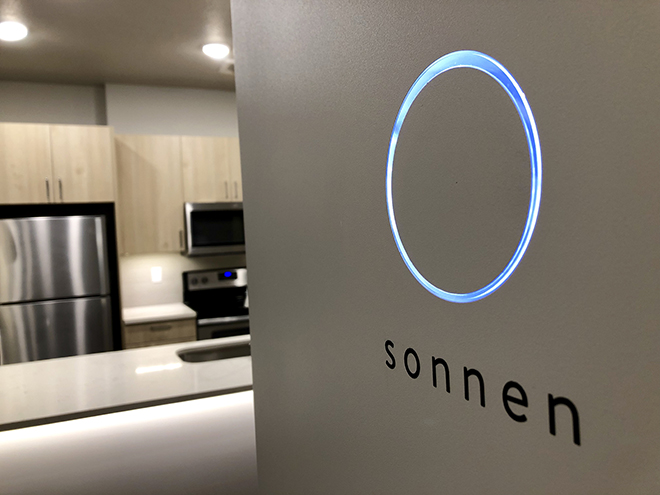
Sonnen plans to harness thousands of residential batteries as virtual power plants across the U.S. |
Sonnen Inc., a U.S.-based energy storage affiliate of oil and gas giant Shell PLC, intends to expand its remote-controlled clusters of residential battery systems, frequently referred to as virtual power plants, across the country.
The model is designed "to kill fossil-fuel power plants and enable renewables," Sonnen Chairman and CEO Blake Richetta said in an interview.
"Look, utility-scale solar, utility-scale wind, have no real future replacing peaker power plants [or] intermediate-load power plants unless we can make them firm and dispatchable," Richetta said.
Toward that end, Sonnen plans to help plug the gaps in intermittent renewable energy generation by steering "swarms" of small-scale batteries to charge when solar and wind farms fill the grid with high levels of carbon-free electricity. Batteries then collectively discharge during peak power demand in the evening, when natural gas-fired peakers typically ramp up.
With the passage of a 30% stand-alone storage investment tax credit as part of the Inflation Reduction Act, Sonnen anticipates having more flexibility with its virtual power plants starting in 2023. Under current rules that apply through the end of this year, homeowners can qualify batteries for the credit when charging only from an on-site solar array.
The change aligns with Sonnen's ambition to launch a series of new, more sophisticated virtual power plants in California and Texas.
Sonnen described one of its new initiatives, dubbed sonnenConnect, as "California's most advanced consumer battery program to date." If successful, it could help to accelerate the state's aspired transition to cleaner sources of power by enticing thousands of households to provide essential grid services in the California ISO wholesale market.
Solar and storage installer Baker Electric Home Energy, part of Escondido, Calif.-based electrical contractor Baker Electric Inc., is the first to join forces with Sonnen on the program.
"Baker will lead the charge and other solar contractors will come," Richetta said.
'Alternative to net metering'
The move comes as the California Public Utilities Commission considers a sweeping revision of the state's net energy metering program that could slash payments for rooftop photovoltaic, or PV, generation.
"It doesn't matter what happens in net metering and grid-injection regulation because we can replace the lost compensation," Richetta said.
"We see smart batteries as the heart of a clean energy future, and Sonnen's capabilities give us the potential to revolutionize how rooftop PV is sold and utilized in California," Mike Teresso, president of Baker Electric Home Energy, said in a statement.
The Sonnen program "allows us to offer our solar-plus-battery customers the ultimate combination of lower electric bills, access to backup power resiliency, and ongoing compensation for grid services that offers an alternative to net metering," Teresso said.
Baker, which recently started enrolling customers, intends to harness 75 MWh of Sonnen energy storage resources at more than 5,000 solar-powered households in Southern California by the end of 2025.
The program builds on already completed Sonnen virtual power plant projects at apartment complexes in California and Utah, where the company launched its model in the U.S. Sonnen plans to unveil an initiative in Texas later this year. The approach originated with parent company Sonnen GmbH in Germany, which Shell acquired in 2019.
Sonnen is part of Shell's growing renewable energy and energy solutions segment. The division's current director, Wael Sawan, was named incoming CEO of Shell PLC in mid-September.
The segment, which includes renewable and natural gas-fired power sales, boosted its adjusted earnings in the second half of 2022 by more than 1,000% from a year ago to $1.07 billion, largely on gas and power price volatility.
Sawan also directs Shell's integrated gas business.
Behind-the-meter and large-scale battery storage systems in early September helped California through a prolonged heat wave and series of grid emergencies amid record demand for electricity. Companies including Sonnen, home solar specialist Sunrun Inc. and Tesla Inc. contributed with residential virtual power plants through California's emergency load reduction program.
SonnenConnect is broader in scope. The company plans to leverage Shell's large presence in the CAISO market to bid coordinated residential batteries on a daily basis rather than use them primarily in grid emergencies or for backup power, according to Richetta.
"We're trying to kill fossil fuel power plants and enable renewables; this is the purpose for us," Richetta said. "And when you use the battery twice in a year, this not the purpose."
Shell, which sells natural gas for power generation in California and gas-fired electricity in wholesale markets, has a strategic goal to become a net-zero emissions energy business by 2050.
S&P Global Commodity Insights produces content for distribution on S&P Capital IQ Pro.



